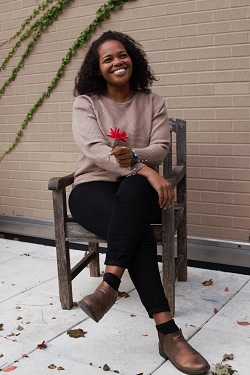Antoinette Johnson shares her experience of Binge Eating Disorder and the need for diversity and representation in this space
 The image that most people conjure up in their mind when they think about someone with an eating disorder, probably isn’t me. But in February 2020 I was diagnosed with Binge Eating Disorder (BED), an eating disorder that affects more people than anorexia and bulimia combined.
The image that most people conjure up in their mind when they think about someone with an eating disorder, probably isn’t me. But in February 2020 I was diagnosed with Binge Eating Disorder (BED), an eating disorder that affects more people than anorexia and bulimia combined.
Binge Eating Disorder is a serious mental illness where people eat very large quantities of food without feeling in control of what they’re doing, but they don’t follow it with purging.
It can affect anyone of any age, gender, ethnicity or background and was only officially recognised as an eating disorder diagnosis in 2013.
Unknowingly suffering from an eating disorder, I experienced depression, anxiety, panic attacks and a constant desire to end my life - I just wanted to be free from the emotional pain I was feeling.
It was only when I went to the GP, feeling low, and attributing it to the loss of my grandmother, that her probing but sensitive questions led to my first referral and eventually, a diagnosis.
I was fortunate to access treatment within a year, especially during a pandemic, and by the time I’d finished a combination of individual therapy and a three-month group therapy programme, I was discharged at the end of 2020 with the final words from my therapist saying; ‘Ms Johnson no longer meets diagnostic criteria for an eating disorder and I am confident of her ability to maintain this.’
In January, I created a recovery guide of my top ten takeaways from therapy and I started The Fat.Ugly Blog to continue my reflections along my recovery journey.
I’m pleased to say that on 1 May 2021, I celebrated six months of being binge and restriction free. I now eat what I want without the fear of it leading to a binge, I feel my emotions rather than numbing them with food, I’m improving my body image and I learned some practical tools and strategies that have helped me in my recovery.
At thirty-nine years old, it’s an indescribable feeling to finally know I am free from something that developed and has affected me since I was eight.
There were times throughout my life when I considered I might have an eating disorder or just needed real help to deal with the intense distress I felt, but like many people, I accepted that if I just got stronger, stuck to my diet rules, lost weight and managed my emotions better, I’d be ok, especially as “black people don’t have eating disorders, right?”
As I’ve done more research and engaged with organisations like Beat, the UK’s Eating Disorder Charity, I’ve noticed the lack of diversity in the media content that’s produced about eating disorders. No wonder I didn’t think it applied to me.
I was pleased to see that for the first time, Beat were going to focus on binge eating disorder during Eating Disorders Awareness Week in March.
In response, I made a commitment to talk about my diagnosis and recovery publicly.
Not only did I want to raise awareness of eating disorders in general, but I wanted to reflect and give voice to the experience of people who look like me.
During that week, I wrote this post about the barriers that make it harder for black people to get help.
I received a message from another black woman in her thirties who was dealing with the symptoms alone. She thanked me for sharing, told me about her own experience and referred to BED as the ‘silent killer’.
I’d like people to know that Binge Eating Disorder is a serious mental illness - it’s not the same as emotional eating or over-eating and doesn’t mean someone is just greedy - and with the right support, recovery is very much possible.
I emphasise the ‘right’ support because although the first GP I saw was extremely supportive, I encountered another one who was the complete opposite and caused a lot of distress at the time.
As a member of St George’s community, working at a specialist healthcare university, I would like to take the opportunity during Mental Health Awareness Week to let you know about the new eating disorders training that Beat has recently released for medical students and foundation doctors.
Information can be found on the Beat website and I hope that we can use this resource to educate students on the signs and how to approach the subject so that everyone suffering from an eating disorder can receive compassion and get the care they need.
Where to get help
We hope that sharing stories like Antoinette's will increase awareness and understanding and help people to reflect on their experience with their own mental health and allow people to support others who may be struggling.
We are grateful for those who have shared their experiences.
We know that the range of experiences included in this series of articles is limited – there are so many overlapping factors linked to our identity that will impact our mental health and perspective.
If any of the experiences shared have resonated with you, we would encourage you to join our staff networks, which are open to all.
We have 3 staff networks at St George’s: